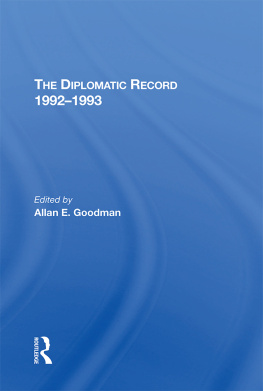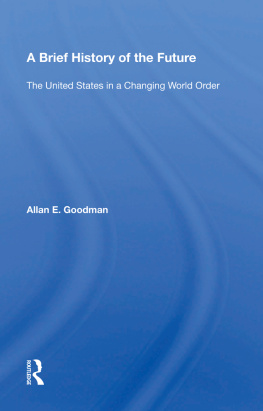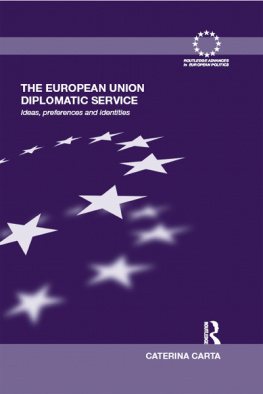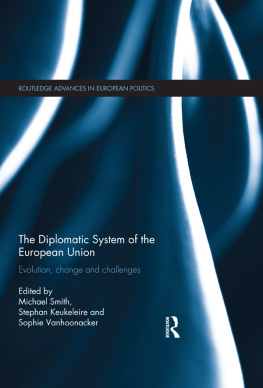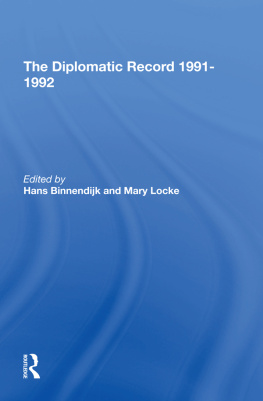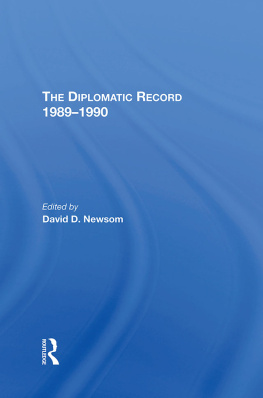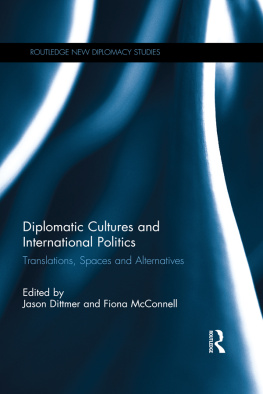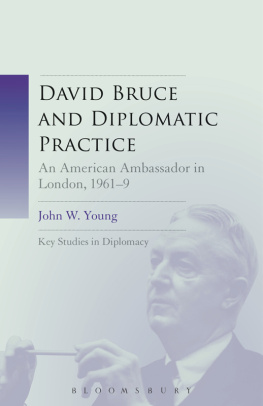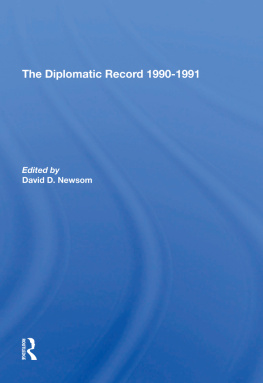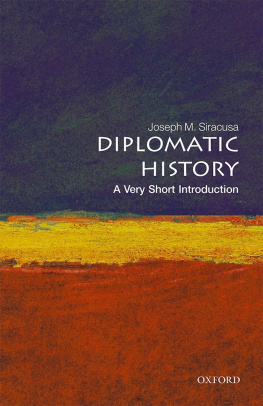THE DIPLOMATIC RECORD 1992-1993
Published in cooperation with the
INSTITUTE FOR THE STUDY OF DIPLOMACY
School of Foreign Service, Georgetown University
An integral part of the Georgetown University School of Foreign Service, the Institute for the Study of Diplomacy concentrates on the processes of diplomacy. Through its research and publication programs, the Institute seeks to improve diplomatic skills and broaden public understanding of diplomacy.
Advisory Committee
Hans Binnendijk
Washington, DC
Richard Burt
Washington, DC
Peter Dunkley
Washington, DC
Brandon Grove
Washington, DC
J. Bryan Hehir
Boston, MA
Franois Heisbourg
London, England
Gary Hufbauer
Washington, DC
Karl Kaiser
Bonn, Germany
Peter K. Krogh
Washington, DC
Robert Lieber
Washington, DC
Christopher Maule
Ottawa, Canada
Theodore Moran
Washington, DC
David D. Newsom
Charlottesville, VA
Jeswald W. Salacuse
Medford, MA
Editorial Staff
Allan E. Goodman
Editor
Jean C. Newsom
Associate Editor
Charles Dolgas
Production Coordinator
Michael Snyder
Production Assistant
James Bjork
Sandra McMahon
Jeffrey Osterroth
Lela R. Scott
Research Assistants
The Diplomatic Record 1992-1993
edited by
Allan E. Goodman
Institute for the Study of Diplomacy
First published 1995 by Westview Press, Inc.
Published 2019 by Routledge
52 Vanderbilt Avenue, New York, NY 10017
2 Park Square, Milton Park, Abingdon, Oxon OX14 4RN
Routledge is an imprint of the Taylor & Francis Group, an informa business
Copyright 1995 Taylor & Francis
All rights reserved. No part of this book may be reprinted or reproduced or utilised in any form or by any electronic, mechanical, or other means, now known or hereafter invented, including photocopying and recording, or in any information storage or retrieval system, without permission in writing from the publishers.
Notice:
Product or corporate names may be trademarks or registered trademarks, and are used only for identification and explanation without intent to infringe.
Library of Congress ISSN: 1052-0309
ISBN 13: 978-0-367-29133-4 (hbk)
Contents
Robert M. Hay den
Joseph G. Sullivan
Herman J. Cohen
Cameron R. Hume
Anatoly V. Torkunov and Andrei V. Zagorski
Grzegorz Kostrzewa-Zorbas
Sam Nunti and Richard Lugar
Allan E. Goodman
Laurie Mylroie
Lance N. Antrim
The world remains a dangerous place. But it was the diplomat rather than the commander who was more frequently deployed to keep the peace or to make it where none had existed in 1992-1993. The nature of the transformations set in motion with the end of the Cold War and the collapse of most forms of state communism, as well as the way these developments continue to shape the agenda for diplomacy, became both clearer and more urgent. As a result, the service of the diplomat was increasingly enlisted as conflicts unfolded rather than only when it was clear that force had failed. There was, consequently, a much greater need than ever for coordination between national security and foreign policies and access by diplomats to top decisionmaking levels. This Record focuses on how that coordination developed, from the perspective of those who were actually involved and the conditions under which negotiations to resolve a wide variety of conflicts have been successful.
In the process, presidents and foreign ministers have learned that diplomats are not miracle workers, especially when toleration of differences of all kindspolitical, ethnic, and religiousseems in short supply. No universal recipes are to be found that can be applied in arbitrating and preventing conflictand some conflicts are far from ready to be resolved by negotiation and peaceful means.
The authors of this volume begin by looking at what diplomacy could not do to end the tragedy that is, as Robert Hayden writes, "the Bosnian debacle." In regard to this tragic conflict, no one escapes blame for misunderstanding its origins, dynamics, potential for genocide, and resistance to settlement. As Hayden demonstrates, when these conditions prevail, what diplomats can do is severely limited, and their efforts may make things considerably worse. For diplomacy to work effectively, it must be tailored to present realities and it must also take advantage of changing conditions.
A sense of how much the world and the potential for diplomacy to promote conflict resolution had changed with the end of the Cold War is perhaps most clearly portrayed in Joseph Sullivan's account of the process by which a peace agreement was reached in El Salvador. Sullivan details the negotiations in 1990 and 1991 against the backdrop of the changes taking place at the time in world politics. He shows how the concept of a world order based on democratic principles and the rule of law can contribute directly to progress at the negotiating table. He also suggests that once such negotiations are under way, the monitoring and encouragement of them by the international community add significantly to the chances for their success. Negotiating under these circumstances, the author suggests, is at least as important as the commitment of the parties themselves to resolving their conflicts by diplomacy rather than by force.
Ambassador Herman Cohen chronicles the coordination between UN and American diplomats as they confronted the political chaos and breakdown of the social and economic order in Somalia in the wake of the over-throw of the Siad Barre dictatorship. He credits UN Secretary General Boutros Boutros-Ghali with helping the international community to recognize a new set of crises that would have to be dealt with in the post-Cold War erahumanitarian crisesin which intervention was both appropriate and essential, even though the outcome might not affect peace and security on a regional or global scale. Cohen suggests that, working in tandem with individual countries, and under a UN mandate for peacemaking, the international community may better insure domestic support and reach objectives less attainable by those individual countries: the amelioration of human suffering and the restoration of shattered nations. Thus when the US military intervention did come, Cohen explains, it could be legitimized and politically defended as a limited step that would create a secure environment for immediate relief operations while the UN prepared to take over the role of peace-enforcer.
In the chapter by Cameron Hume, he focuses on the role of nongovernmental diplomacy in stopping what he terms wars of national disintegration. These are conflicts in which there is little clarity about who wants what, why they are willing to fight, and that last much longer than most guerrilla and civil wars. Hume traces the contribution of the good offices of a private body by detailing the work of a lay religious organization (the Community of Sant'Egidio) in ending the conflict over who would govern what was left of Mozambique after nearly two decades of warfare. In his analysis, the author emphasizes the variety of ways in which diplomacy can work in the post-Gold War international system. Hume also stresses the potential that exists for regional conflict resolution without the necessity, in every instance, for major power initiatives or deep involvement by senior officials. He also reminds us of the personal qualities that are essential for effective diplomacy; they are not the exclusive preserve or talents of only those accredited to foreign ministries.

